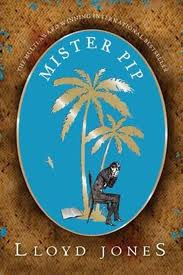 Normally I’m almost worryingly meticulous about choosing what books I should read but Mister Pip was a spur of the moment choice. I’d heard of Lloyd Jones before, not Mister Pip, but it sounded interesting (a tropical island setting, the threat of civil war). As you might gather from the title, Mister Pip revolves around the novel Great Expectations.
Normally I’m almost worryingly meticulous about choosing what books I should read but Mister Pip was a spur of the moment choice. I’d heard of Lloyd Jones before, not Mister Pip, but it sounded interesting (a tropical island setting, the threat of civil war). As you might gather from the title, Mister Pip revolves around the novel Great Expectations.
On the island of Bougainville, near Papua New Guinea, civil war threatens to break out. Mr Watts, the only white man left in Bougainville, takes on the position of schoolteacher. He has no training and little knowledge to pass on. All Mr Watts has is a copy of Charles Dickens’s Great Expectations (‘the greatest novel by the greatest English writer of the nineteenth century’) and a belief that everything worth knowing can be found within its pages. Matilda, a girl in his class, is captivated by Great Expectations’ renowned protagonist, Pip, and the power of storytelling. Mr Watts’s meddling in the lives of the Bougainvilleans isn’t always as well received by the adults and when mixed with the oppressive redskin soldiers’ dogged pursuit of local rebels it produces dire consequences.
The high level of Great Expectations-related content didn’t really register when I chose Mister Pip, that or I momentarily forgot I don’t really like Dickens. I don’t think it would really hamper your enjoyment not to, but a working knowledge of Great Expectations wouldn’t hurt. I’ve read some of the book (I never have bothered to finish any Dickens) and have seen the 1946 movie version twice, which seemed to be enough background.
Now since I’m not Mr Dickens’s biggest fan I was a bit incredulous about the profound impact Great Expectations could have but I do understand the impact a book can have, especially when young. I had similar obsessions with R.L. Stine and Roald Dahl when I was in primary school (not highbrow tastes but the effect was the same). Books help us make sense of the world and, in turn, we don’t just read them in a vacuum, our understanding of them comes from what’s around us. Mister Pip celebrates the power of books and storytelling to get you through hard times. For Matilda, Great Expectations is an escape from a violent world but she can also see a glimmer of her own life, through Pip, mirrored back. These refracted shards of reality help Matilda make sense of life and feel a little less alone.
The challenge of Mister Pip is to identify with the island natives. Characters like Matilda’s mum, Dolores, who hates Mr Watts’s interference in her daughter’s life, made little sense to me. I can see Jones trying to inspire empathy for her but she comes across as a God-fearing, petulant child. Her way of thinking is so far removed from my own, that the default is to always side with Mr Watts. The relationship between Matilda and her mother has truth to it though. The betrayal Dolores feels when Matilda trusts the wisdom of Mr Watts, a white, atheist interloper, over her own is the hurt all parents feel when they are no longer the sole focus of their child’s admiration and love.
Parts of the novel frustrated me. Several major plot developments hinge on characters behaving in a way I thought seemed irrational (Matilda’s mum hiding Great Expectations, Mr Watts telling the rambos that he is Mister Pip). They’re dealing with soldiers who are looking for any excuse to kill, rape and destroy, so they may not be at their most logical but too much rested on these misunderstandings. Lloyd Jones’s adult characters are nuanced, never wholly right or wrong (which I normally love) but their particular flaws were maddening. I’ve shared my feelings on Dolores but Mr Watts doesn’t get away reputation unblemished. He seemed to be a man whose only remarkable qualities were a strange obsession with Great Expectations and being the only white man left on a small island. Perhaps it’s unfair, but I was disappointed in him. Yet I saw why Mr Watts meant so much to Matilda (and I bonded with her), during a turbulent time he gave her someone to admire and believe in.
Mister Pip is centred on several startlingly significant events but the moments in between languished. A significant chunk of the novel is spent (wasted) on Matilda and her classmates reconstructing the plot and dialogue of Great Expectations from memory after their copy is lost. And after its powerful climax, Mister Pip continued on longer than I liked.
Lloyd Jones has written a poignant, charming book, interspersed with moments of harsh reality, violence and suffering. It’s fairytale or fable-like in the raw beauty of its prose and its quiet moral complexity. But I think it’s that same quality that was what bothered me when it came to the characters’ actions. Instead of acting in their own best interests Jones’s characters seemed to exist to serve the fable, often to their detriment.
